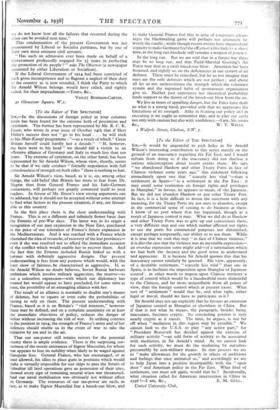[To the Editor of THE SPEcratoa] • ground of an
inaccuracy regarding the Far East, and I would refrain from doing so if the inaccuracy did not disclose a serious misconception about recent events there. He says " we abandoned Hankow and other Treaty Ports in face of Chinese violence some years ago," this statement following immediately upon one that " scarcely less vital "—than a settlement in Spain—" is a settlement in the Far East : it may entail some restriction on foreign rights and privileges in Shanghai," in favour, he appears to mean, of the Japanese. But we did not abandon Hankow or any other Treaty Port. In fact, it is a little difficult to invest the statement with any meaning, for the Treaty Ports are not ours to abandon, except in the commercial sense of ceasing to do business at them. I know of no port where that has happened, though as a result of Japanese control it may. What we did do at Hankow and other Treaty Ports was to give up our concessions there, a very different step and one which neither affected our rights to use the ports for commercial purposes nor diminished, except perhaps temporarily, our ability so to use them. While it is true that we took this step " in face of Chinese violence," it is also the case that the violence was an inevitable expression— an overdue expression some might add—of a nationalism which we had both the decency and the good sense to understand and appreciate. It is because Sir Arnold ignores this that his inaccuracy cannot similarly be ignored. His view, apparently, of a desirable settlement, " scarcely less vital " than one in Spain, is to facilitate -the imposition upon Shanghai of Japanese control : in other words to impose upon Chinese territory a type of control which would be a hundredfold more distasteful to the Chinese, and far more unjustifiable from all points of view, than the foreign control which at present exists. What sort of " settlement " would that be, and what right, either legal or moral, should we have to participate in it ?
Sir Arnold does not say explicitly that he favours an extension of Japanese control at Shanghai or elsewhere in China. But if that is not what he means, the paragraph, besides being inaccurate, becomes cryptic. Its concluding portion is very nearly cryptic as it stands. The time, he argues, is not far off when " mediation in this region may be possible." We cannot look to the U.S.A. to play " any active part," for " President Roosevelt has decided against the exercise of military activity "—an odd form of activity to be associated with mediation, in Sir Arnold's mind. As we cannot look for such activity, we must do the mediating by ourselves presumably by non-military means. In that process we are to " make allowances for the growth in others of ambitions and feelings that once animated us," and accordingly we are to help Japan into a position incompatible with the " open door " and American policy in the Far East. What kind of settlement, one must ask again, would that be ? Incidentally, what situation called for American intervention in China in










































 Previous page
Previous page